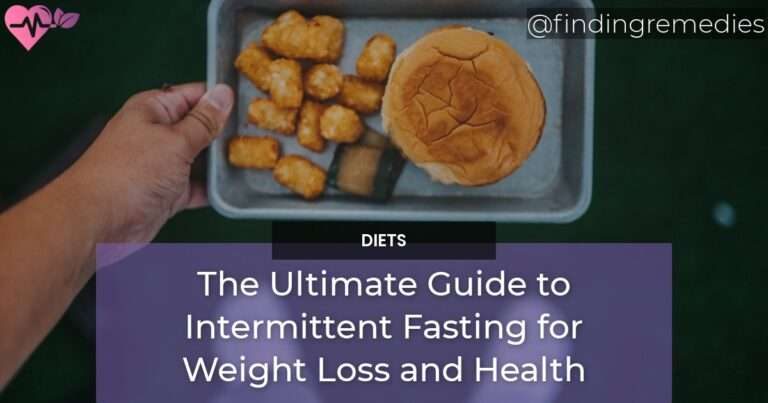If you’re looking to lose weight and improve your health, then intermittent fasting could be the answer. Intermittent fasting is a dieting pattern where you alternate between periods of eating and fasting, and it has been gaining popularity in recent years.
In this ultimate guide, we’ll explore the benefits of intermittent fasting, how to get started, and how to make it work for you. You’ll learn the different types of intermittent fasting, the potential health benefits, and how to make it part of your lifestyle. By the end of this guide, you’ll have all the tools and knowledge you need to incorporate intermittent fasting into your life and reach your health and weight loss goals.
Table of Contents
Overview
What is Intermittent Fasting?
Intermittent fasting (IF) is a type of eating pattern that involves periods of food restriction followed by periods of normal eating. This eating pattern does not dictate which foods to eat or avoid but rather when to eat them.
How Does Intermittent Fasting Work?
IF works by improving nutrient timing, body composition, metabolic health, and digestive system. It induces autophagy, which is the process by which the body cleans out damaged cells and regenerates new ones. Additionally, it improves insulin sensitivity, cellular repair, blood sugar control, weight loss, longevity, diabetes prevention, inflammation, cardiovascular health, mental health, brain function, and muscle retention.
Key Components
Types of Intermittent Fasting
There are several types of IF, including:
- 16/8 method: involves restricting food intake to an 8-hour window and fasting for the remaining 16 hours
- 5:2 diet: involves eating normally for 5 days and restricting calorie intake to 500-600 calories for the remaining 2 days
- Alternate-day fasting: involves fasting every other day and eating normally on non-fasting days
- 24-hour fasts: involves fasting for 24 hours once or twice a week
Fasting and Feeding Windows
The fasting window is the period during which food is restricted, while the feeding window is the period during which food is consumed. The length of these windows depends on the specific type of IF being followed.
Caloric Intake
Caloric intake during the feeding window should be sufficient to meet daily nutritional needs. However, it is important to maintain a calorie deficit in order to achieve weight loss goals.
ALSO READ
Health Benefits
Weight Loss
IF can promote weight loss by reducing overall caloric intake and inducing ketosis, which is a metabolic state in which the body burns fat as its primary source of fuel.
Improved Insulin Sensitivity
IF can improve insulin sensitivity by reducing insulin resistance, which is a risk factor for type 2 diabetes.
Reduced Inflammation
IF can reduce inflammation by decreasing oxidative stress and increasing antioxidant activity in the body.
Improved Heart Health
IF can improve heart health by reducing blood pressure, cholesterol levels, and triglycerides.
Brain Function
IF can improve brain function by promoting the growth of new neurons, increasing neuroplasticity, and reducing the risk of neurodegenerative diseases.
Scientific Evidence
Studies on Intermittent Fasting and Weight Loss
Several studies have shown that IF can lead to significant weight loss, particularly in obese individuals.
Studies on Intermittent Fasting and Insulin Sensitivity
IF has been shown to improve insulin sensitivity and reduce insulin resistance in both healthy and diabetic individuals.
Studies on Intermittent Fasting and Inflammation
IF has been shown to reduce inflammation in the body, which is a risk factor for numerous chronic diseases.
Studies on Intermittent Fasting and Heart Health
IF has been shown to improve heart health by reducing blood pressure, cholesterol levels, and triglycerides.
Studies on Intermittent Fasting and Brain Function
IF has been shown to improve brain function by promoting the growth of new neurons, increasing neuroplasticity, and reducing the risk of neurodegenerative diseases.
ALSO READ
Tips for Success
Start Slowly
It is important to gradually introduce IF into your routine to allow your body to adjust. Start with shorter fasting periods and gradually increase the length over time.
Stay Hydrated
Drink plenty of water during the fasting period to stay hydrated and avoid dehydration.
Eat Nutrient-Dense Foods
During the feeding window, focus on consuming nutrient-dense foods such as fruits, vegetables, whole grains, and lean proteins.
Listen to Your Body
Pay attention to how your body feels during the fasting period and adjust your routine accordingly.
Be Consistent
Consistency is key when it comes to IF. Stick to a regular fasting schedule to maximize the health benefits.
Risks and Precautions
Dehydration
Dehydration can occur during the fasting period if adequate fluids are not consumed. Drink plenty of water and other calorie-free beverages to stay hydrated.
Low Blood Sugar
IF can cause low blood sugar in some individuals, particularly those with diabetes. Monitor blood sugar levels carefully and consult a healthcare provider before starting IF.
Overeating During Feeding Windows
IF can lead to overeating during the feeding window if calorie intake is not monitored. Be mindful of portion sizes and aim to consume nutrient-dense foods.
Disordered Eating Patterns
IF can trigger disordered eating patterns in some individuals. Those with a history of eating disorders should consult a healthcare provider before starting IF.
By following the tips and precautions outlined above, you can safely enjoy the many health benefits of intermittent fasting.
RELATED ARTICLES:

